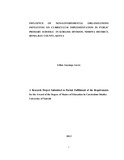| dc.description.abstract | The purpose of this study was to investigate the role of Non-Governmental
Organizations in curriculum implementation in primary school in Kobama
division, Ndhiwa district Homa – Bay County. Specifically, the study sought to
establish whether NGOs in-service training of teachers influences curriculum
implementation; to determine whether NGO’s provision of teaching/learning
materials influences curriculum implementation; to establish whether NGO’s coordination
and monitoring of education activities influence curriculum
implementation and to determine the effects of NGOs support of educational
activities influence curriculum implementation. The researcher employed a
descriptive survey design since it is the preferred method frequently used for the
collection of information on people’s attitudes and opinions. The target
population in this study was 30 public primary schools in Kobama division, 240
teachers and 2,600 standard 6 to 8 pupils in public primary schools in Kobama
division, Ndhiwa district. The primary research instruments of this study were
questionnaires which were in 4 categories. Category one was headteachers, two,
the teachers, three pupils and lastly NGO field officers. Schools sampled for the
study was visited after obtaining authority from National Council of Science and
Technology (NCST) and obtaining permit to warrant research. Appointments
were made with the school head teachers. Data was cleared and coded in a code
sheet. The data was therefore presented using frequency tables, graphs and
percentages. From the tables, graphs and percentages, major findings of the study
xii
and discussion were made. Data from the open ended questions was analyzed
narratively by organizing, data based on themes in the objectives.
From the study, there is very little systematic, critical analysis of who is gaining
access to education offered by alternative providers, or what they are actually
getting access to. Further analysis of alternative provision of education is
therefore needed, including the implications for NGO-government coordination.
Changing aid modalities have led to greater involvement for non-school
providers in policy dialogue, resulting in greater attention to curriculum
implementation in national plans. However, recognition remains limited and
variable across countries. | en |

